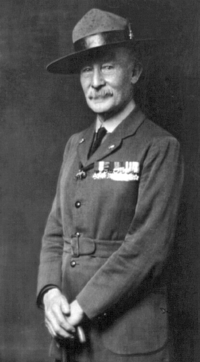|
The Boys' Brigade (BB) is an interdenominational
Christian youth organization, conceived by Sir
William Alexander Smith to combine drill and fun
activities with Christian values. Smith was
born in Pennyland House, Thurso, Scotland. He
was the eldest son of Major David Smith and his
wife Harriet. As a boy, William Smith was
educated at the Miller Instituition, known as
the “Thurso Academy”. Following his father's
death, his family moved to Glasgow. In early
January 1869, William Smith became a pupil in a
private school, The Western Educational
Institution, more widely known as “Burns’ and
Sutherland’s School”. In this first and only
term there, he took seven prizes. His time in
the institution was short-lived as he ended his
school days late in May, at the age of fourteen
and a half.
In October 1869, a few days before he became
fifteen, William Smith entered his uncle’s
business. Alex. Fraser & Co. were wholesale
dealers in “soft goods”, shawls being of 19, he
was promoted to the rank Lance-Corporal. He also
joined the Church of Scotland in that same
year.
Smith was commissioned into the Rifle Volunteers
in 1877 and promoted to Lieutenant later the
same year. He also became a Sunday School
teacher. It was a combination of these two
activities that led him to start the Boys'
Brigade on 4 October 1883 at Free Church Mission
Hall, North Woodside Road, Glasgow. In 1909 he
was knighted by King Edward VII for his services
to children. He also eventually reached the rank
of Major in the Lanarkshire Rifle Volunteers
He died on 14 May 1914 in London.
He was buried in Glasgow. There is a
memorial stone in honor of him in St. Paul's
Cathedral, London, and in St. Giles' Cathedral,
Edinburgh.
Following its inception in Glasgow in 1883, the
BB quickly spread across the United Kingdom and
became a worldwide organization by the early
1890s. The stated object of the Boys' Brigade
is "The advancement of Christ's kingdom among
Boys and the promotion of habits of Obedience,
Reverence, Discipline, Self-respect and all that
tends towards a true Christian manliness."
Except for the addition of the word "obedience"
in 1893, the contents of the object have
remained unchanged from the beginning.
However, some countries, particularly
those which permit girls on their membership
roll, have re-worded the object for gender
neutrality. For example, in Malaysia, the word
"manliness" has been changed to "character".
When designing the Brigade's motto and crest,
William Smith referred directly to Hebrews 6:19
in the King James Version of the Bible, "Which
hope we have as an anchor of the soul, both sure
and steadfast..." The crest was originally a
plain anchor, bearing the BB motto with a
capital 'B' on either side. Upon the merger
between the Boys' Brigade and the Boys' Life
Brigade in 1926, the red Greek cross was placed
behind the anchor to form the current emblem.
The cross originally formed part of
emblem of the Boys' Life Brigade.
|
In May 1903, Robert Baden-Powell (left)
became vice-president; those of you with
a Scouting background will recognize the
name. Robert Stephenson Smyth
Baden-Powell, 1st Baron Baden-Powell,
OM GCMG GCVO KCB (22 February 1857 – 8
January 1941), also known as B-P or Lord
Baden-Powell, was a lieutenant-general
in the British Army, writer, founder of
the Scout Movement and first Chief Scout
of The Boy Scouts Association.
After having been educated at
Charterhouse School in Surrey,
Baden-Powell served in the British Army
from 1876 until 1910 in India and
Africa. In 1899, during the Second Boer
War in South Africa, Baden-Powell
successfully defended the town in the
Siege of Mafeking. Several of his
military books, written for military
reconnaissance and scout training in his
African years, were also read by boys.
Based on those earlier books, he wrote
Scouting for Boys, published in
1908 by Sir Arthur Pearson, for youth
readership. In 1907, he held the first
Brownsea Island Scout camp with the Boys
from Eton College, together with members
of the Bournemouth & Poole Battalion of
The Boys' Brigade. At the time, he did
not originally intend that any
individual organization would later
arise from this aim in the form of the
various Scouting movements of today.
|
 |
|



